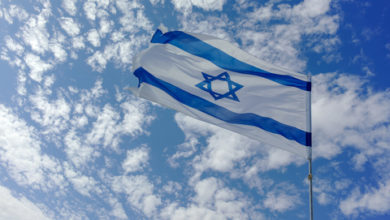“I am Their Deeds” | Haftarah
(Written for those whose custom is to read the Haftarah of Rosh Chodesh even for the month of Elul.)
The essence of Rosh Chodesh (the beginning of a new month) is renewal, based on returning to the beginning. We look back at the beginning of creation and its objectives. And that is why this Haftarah begins with the paradox that exists with respect to the creation of the world: Even though “The heaven is My throne and the earth is My footstool, what house can you build for me, and where can I rest?” [Isaiah 66:1]. However, in any case, “My hand created all these things… and for this I look to the poor person and the one with a broken spirit, who is zealous about My word.” [66:2].
The next verses (3-6) describe the trait of justice of the Holy One, Blessed be He, according to what the Ramchal describes as “Judicial Policy” (in his book “Da’at Tevunot”): “A tumultuous sound comes from the city, a sound from the palace, the sound of G-d paying his enemies retribution” [66:6].
The trait of judgement consists not only of the punishment of the sinners. The redemption of Israel is also part of the judgement: “The hand of G-d will become known to His servants, and His anger to His enemies” [66:14]. This corresponds to the opinion of Rabbi Eliezer – that the redemption of Israel will come after their repentance (Sanhedrin 98b). However, at the same time, the redemption is presented as a foregone conclusion, and this corresponds to the approach of Rabbi Yehoshua, which claims that repentance is not a requirement for redemption to take place. “Will I bring a woman to the birth-stool and not have her give birth, G-d says? Will I, who causes birth, stop it from happening, your G-d says?” [66:9].
The truth is that all of this is the means of G-d on the way to fulfilling the general goal of history – sanctification of the holy name among all the nations. “And I am their deeds and their thoughts” [66:18]. That is, I am hidden within the thoughts and the actions of human beings. “The time has come to gather together all the nations and their languages, let them come and see My glory” [ibid]. It seems that the purpose of the dispersal of Israel among the other nations was to have them join in the process of the Return to Zion, so that they would have the merit of clinging to G-d: “And I will send refugees from them to the other nations… which have not heard My message and have not seen My glory, and they will declare My glory among the nations. And they will bring a gift to G-d together with all your brothers … just as the children of Israel bring sacrifices in a pure vessel to the House of G-d. And I will also accept it for the Priests and the Levites, G-d says.” [66:19-21].
The eternity of the nation of Israel (“So will your offspring and your name remain forever” [66:22]) thus takes on a new meaning: “tikun” – mending the state of the entire world.
Based on this great process, which is a mission of universality for the nation of Israel when it returns to Zion, we can see that Rosh Chodesh, the day when the thought of creation occurred, assumes a new meaning: It stands for the recognition of the Creator by the entire world. Shabbat, which is uniquely related to Israel, is an indication of the central role played by Israel. “And it will happen, at every new moon and every Shabbat, that all flesh will come to bow down before Me – G-d says” [66:23].
Source: “NOTES FROM THE HAFTARAH” – a biweekly column in Shabbat B’Shabbato (Zomet Institute) See: http://www.zomet.org.il/eng – Re’eih 5776, issue 1639.



